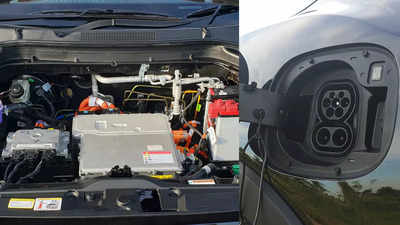EV industry to create 5 million jobs by end of next decade: Suman Bery

EV industry to create 5 million jobs by end of next decade: Suman Bery
According to an official statement from NITI Aayog, the growth of the electric vehicle (EV) industry in India is anticipated to generate approximately five million jobs by the end of the next decade. The statement cited Vice Chairman Suman Bery, who emphasized the growth prospects of the emerging sector during a conference in Goa.
The projection of five million jobs underscores the significant employment potential presented by the EV industry in India. As the country aims to transition to cleaner and more sustainable transportation solutions, the adoption of electric vehicles is expected to increase. This shift not only contributes to reducing carbon emissions and improving air quality but also creates employment opportunities across various segments of the value chain.
The EV industry encompasses a wide range of activities, including manufacturing, research and development, battery production, charging infrastructure development, sales and distribution, and maintenance and servicing. These diverse sectors within the EV ecosystem are expected to witness substantial growth, leading to the creation of numerous job opportunities.

The statement from NITI Aayog reflects the Indian government’s commitment to promoting the adoption of electric vehicles and fostering the growth of the EV industry. The transition to electric mobility aligns with India’s larger sustainability goals and its commitment to combating climate change.
Furthermore, the development of the EV industry in India also presents an opportunity for technological advancements, innovation, and the growth of ancillary industries. It can stimulate the growth of associated sectors such as renewable energy, battery technology, and smart grid infrastructure.
As the EV industry expands, it is expected to attract investments, both domestic and foreign, which will further contribute to job creation and economic growth. The government’s initiatives and policies aimed at promoting electric mobility, such as incentives for EV adoption, charging infrastructure development, and supportive regulatory frameworks, play a crucial role in facilitating the growth of the industry and its associated employment opportunities.
The conference, where Vice Chairman Suman Bery highlighted the growth prospects of the electric vehicle industry, took place on the sidelines of the fourth energy transition working group meeting held under India’s G20 Presidency. The working group meeting focused on discussing strategies and measures to achieve growth in the electric mobility ecosystem.
As India assumes the G20 Presidency, it provides a platform to engage with global stakeholders and drive discussions on transitioning to clean and sustainable energy sources, including electric mobility. The conference facilitated dialogue among participants to explore avenues for advancing the electric vehicle sector, including policy frameworks, technological advancements, and collaboration among industry players.
The energy transition working group meetings under the G20 Presidency serve as crucial forums for sharing best practices, experiences, and ideas related to energy transition, renewable energy, and sustainable transportation. These meetings bring together policymakers, industry leaders, experts, and representatives from various countries to collectively address challenges and identify opportunities for fostering the growth of clean and sustainable energy solutions.
By organizing conferences and working group meetings on the sidelines of the G20 Presidency, India aims to leverage the international platform to promote electric mobility and exchange knowledge on successful strategies and initiatives. It allows for the sharing of insights and experiences from different countries and facilitates collaboration among nations to accelerate the adoption of electric vehicles and achieve common energy transition goals.
The discussions held during the conference would have encompassed topics such as policy frameworks, charging infrastructure development, battery technology advancements, regulatory reforms, and industry partnerships. The aim was to identify pathways for realizing the growth potential of the electric mobility ecosystem, leveraging global best practices and collaborative efforts.
Overall, the conference held alongside the fourth energy transition working group meeting under India’s G20 Presidency provided a platform for key stakeholders to discuss strategies and approaches for advancing the electric vehicle industry and achieving sustainable growth in the electric mobility ecosystem. It underscored India’s commitment to clean energy transitions and collaboration on a global scale to address climate change and promote sustainable development.
Vice Chairman Suman Bery emphasized that the expansion of India’s electric vehicle (EV) industry serves as a catalyst for job creation, projecting the generation of approximately five million direct and indirect employment opportunities by the end of the next decade. He highlighted the significant potential of the EV industry to address two critical challenges: sustainable urbanization and unemployment.
The growth of the EV industry provides a unique opportunity to create jobs and tackle the pressing issues of urbanization and unemployment simultaneously. As the adoption of electric vehicles increases, it will lead to the establishment of new businesses, manufacturing units, research and development centers, and service networks. These developments will generate employment across various sectors, including manufacturing, technology, infrastructure development, and service industries.
The creation of five million direct and indirect job opportunities signifies the broad impact of the EV industry on employment and the economy. These opportunities will not only benefit skilled professionals but also provide avenues for job creation in supporting industries and services. This will contribute to economic growth, enhance livelihoods, and improve the overall well-being of citizens.
Furthermore, the expansion of the EV industry aligns with sustainable development goals, promoting cleaner transportation, reducing carbon emissions, and mitigating the environmental impact of urbanization. By embracing electric mobility, India can work towards building sustainable cities and achieving a more environmentally friendly future.
Addressing the challenges of sustainable urbanization and unemployment through the growth of the EV industry demonstrates a holistic approach to societal development. By creating job opportunities in a sector that prioritizes sustainability, India can strive for a brighter future that benefits both its citizens and the planet.
According to the statement, India’s electric vehicle (EV) market is projected to experience a remarkable compound annual growth rate (CAGR) of 49% from 2022 to 2030. This highlights the significant potential for expansion and adoption of EVs in the country’s transportation sector. The statement further emphasizes that India is making rapid progress towards achieving its target of attaining a 30% market share for EVs by 2030.
The robust growth rate projected for India’s EV market signifies a strong shift towards cleaner and more sustainable modes of transportation. This growth is propelled by various factors, including favorable government policies and incentives, technological advancements, increasing awareness about environmental concerns, and evolving consumer preferences.
India has been actively promoting the adoption of EVs through policy measures such as subsidies, tax benefits, and the establishment of charging infrastructure. These initiatives have been instrumental in encouraging consumers and businesses to transition towards electric mobility.

The target of capturing a 30% market share for EVs by 2030 demonstrates India’s commitment to sustainable transportation and reducing the country’s carbon footprint. It aligns with the nation’s broader goals of mitigating climate change, improving air quality, and reducing dependence on fossil fuels.
To achieve this target, various stakeholders, including government agencies, manufacturers, and infrastructure developers, are collaborating to build a robust ecosystem for EVs. This includes investments in research and development, battery manufacturing, charging infrastructure deployment, and capacity building.
The projected growth of India’s EV market and the pursuit of the 30% market share target signify a transformative shift in the country’s transportation landscape. It presents a significant opportunity for job creation, technological advancements, and sustainable economic growth.
The statement highlights that the growth of electric vehicles (EVs) in India will have far-reaching positive impacts, extending beyond the economy to encompass significant social and environmental benefits. This growth aligns with India’s vision of pursuing low-carbon pathways to facilitate its goal of achieving net-zero emissions by 2070.
The adoption of EVs promotes sustainable economic growth by stimulating various sectors of the economy. It creates employment opportunities across the value chain, from manufacturing and research to sales and services. The growth of the EV industry can contribute to GDP growth, technological advancement, and innovation, fostering economic prosperity in the long run.
Moreover, the transition to EVs brings about environmental benefits by reducing carbon emissions and mitigating air pollution. EVs produce zero tailpipe emissions, significantly reducing the release of pollutants and greenhouse gases. By replacing conventional internal combustion engine vehicles with EVs, India can contribute to improving air quality, mitigating the impacts of climate change, and protecting public health.
The statement emphasizes that the growth of EVs supports India’s commitment to a sustainable future and the goal of achieving net-zero emissions by 2070. By embracing low-carbon pathways, India can minimize its carbon footprint and play a crucial role in global efforts to combat climate change.

Additionally, the transition to EVs aligns with India’s international commitments, such as the Paris Agreement, which aims to limit global warming and transition towards a low-carbon economy. By promoting the adoption of EVs, India can demonstrate its leadership in sustainable development and contribute to global climate goals.
The social benefits of EV adoption are also significant. Electric vehicles are quieter, reducing noise pollution in urban areas. The use of EVs can also improve energy security by reducing dependence on imported fossil fuels and promoting the utilization of domestically available renewable energy sources.




